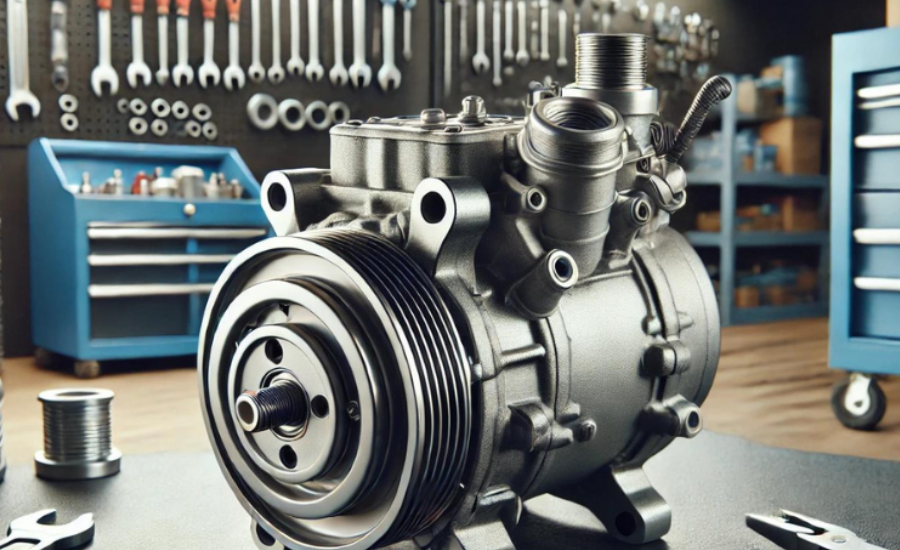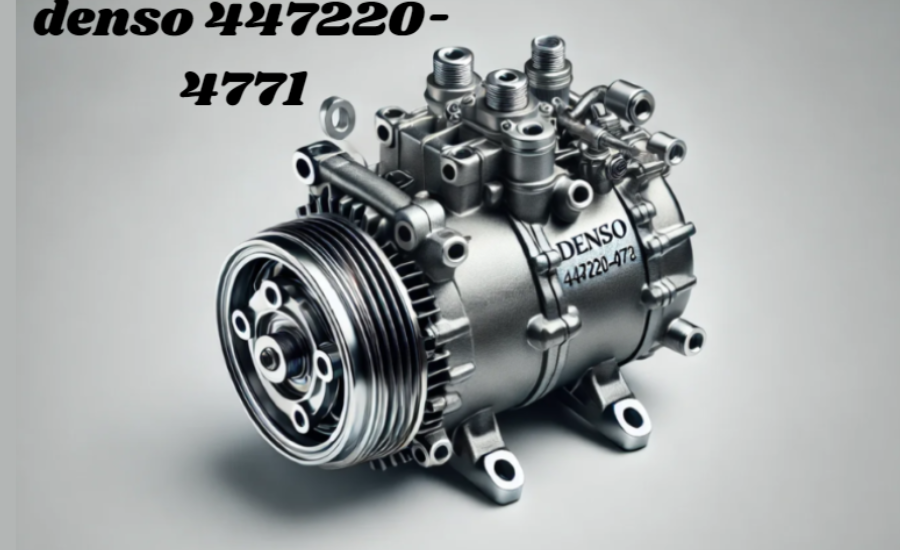Introduction to the Denso 447220-4771
When it comes to automotive components, few are as indispensable as the Denso 447220-4771. This part plays a crucial role in maintaining your vehicle’s comfort and functionality, particularly when it comes to the air conditioning system. But what exactly is the Denso 447220-4771, and why does it matter so much? In this comprehensive guide, we’ll dive deep into what makes this component so essential, its functionality, tips for effective maintenance, and future innovations you should watch out for.
Why the Denso 447220-4771 Is Vital to Your Vehicle

The Denso 447220-4771 is more than just a component; it is the heart of your vehicle’s air conditioning system. Classified as an air conditioning (AC) compressor, this part is responsible for compressing and circulating refrigerant, which is essential for cooling the air that flows into your vehicle’s cabin. Imagine driving on a scorching summer day without the luxury of air conditioning — this compressor is what prevents that from becoming a reality.
Without the Denso 447220-4771, the cooling process would not function properly. This component ensures that the refrigerant moves through the AC system in a continuous cycle, helping to regulate the temperature inside your vehicle. Whether you’re commuting in a personal car or managing a fleet of trucks, the Denso 447220-4771 is a critical component for maintaining comfort and safety on the road.
What Makes the Denso 447220-4771 Stand Out?
The Denso 447220-4771 is not just any AC compressor. It is engineered to meet the high standards demanded by modern vehicles across various industries. Its reputation for quality and reliability makes it a preferred choice for automotive manufacturers, repair shops, and fleet management services worldwide.
One of the reasons for its popularity is its adaptability. Whether installed in a compact car, a heavy-duty truck, or specialized machinery, the Denso 447220-4771 consistently delivers efficient performance. Its robust construction and thoughtful design ensure that it can withstand the harsh conditions often encountered in automotive applications, from extreme heat to constant vibrations.
Understanding the Functionality of the Denso 447220-4771

To fully grasp the significance of the Denso 447220-4771, it’s important to understand its intricate design and operation. This AC compressor is crafted with precision, utilizing high-quality materials like aluminum to offer both strength and lightweight properties. The compressor features various critical elements, such as the compressor clutch, pulley, pistons, and internal components that work together to move the refrigerant through the system.
When the air conditioning system is activated, the compressor clutch engages, drawing power from the engine via the pulley. This action initiates the compression of refrigerant, which is then circulated throughout the AC system. The compressor’s design allows it to maintain a balance between cooling demand and energy consumption, ensuring optimal performance without unnecessarily taxing the vehicle’s engine.
The Technical Aspects: What’s Inside the Denso 447220-4771?
The Denso 447220-4771 is constructed using high-grade aluminum, known for its excellent strength-to-weight ratio. Inside the compressor, you’ll find a complex arrangement of pistons or scrolls, depending on the specific model. These elements work together to compress the refrigerant effectively, allowing the air conditioning system to function efficiently under a variety of conditions.
The compressor clutch plays a pivotal role in this process, engaging and disengaging in response to the vehicle’s cooling needs. This dynamic operation helps conserve energy and extend the compressor’s lifespan by reducing wear and tear. Additionally, the Denso 447220-4771’s design includes multiple safety features to prevent damage from overpressure, which can occur due to refrigerant blockages or leaks.
Common Problems and How to Prevent Them

Like any mechanical part, the Denso 447220-4771 can experience issues over time. Some of the most common problems include refrigerant leaks, worn-out bearings, and clutch malfunctions. Leaks can occur due to damaged seals or hoses, while bearings may wear out because of inadequate lubrication or excessive stress. Clutch failures often result from overheating or electrical issues.
Early Diagnosis and Prevention:
- Refrigerant Leaks: Regularly inspect the AC system for leaks, which can often be identified by a hissing noise or reduced cooling efficiency. Using a leak detection dye can also help pinpoint small leaks before they become major issues.
- Bearing Maintenance: Ensure that the compressor’s bearings are properly lubricated. A squealing noise when the AC is running could indicate worn-out bearings that need attention.
- Clutch Inspection: The compressor clutch should be examined periodically for signs of wear or damage. If you notice any burning smells or hear unusual noises when the AC is activated, it might be time to replace the clutch.
Proactive Maintenance for Longevity
Routine maintenance is crucial to keeping the Denso 447220-4771 operating smoothly. Start by checking refrigerant levels regularly; low levels can strain the compressor and lead to overheating. Make sure all hoses and seals are intact and free from cracks or leaks. Also, lubricate moving parts like bearings to prevent friction and wear.
Pay attention to the compressor’s performance during regular vehicle check-ups. Unusual sounds, reduced cooling efficiency, or a burning smell could signal potential issues. Address these promptly to avoid more extensive damage. Investing in routine inspections and following the manufacturer’s maintenance guidelines can help you get the most out of your AC compressor.
Finding the Right Denso 447220-4771 for Your Vehicle
When it’s time to replace your Denso 447220-4771, it’s essential to purchase a genuine, high-quality part. Counterfeit or substandard components may not meet your vehicle’s specific requirements and can lead to further damage or reduced performance.
Tips for Purchasing:
- Authorized Dealers: Always buy from authorized dealers or well-established retailers. This ensures that you are purchasing an authentic Denso 447220-4771 that meets the required specifications.
- Online Marketplaces: While buying online, check for verified sellers and customer reviews to confirm the product’s authenticity. Look for certifications that guarantee the part’s quality.
The Future of the Denso 447220-4771: What to Expect

The automotive world is constantly advancing, and the Denso 447220-4771 is evolving with it. Future innovations may introduce more durable materials, improved designs, and smarter technology integration. For instance, some manufacturers are experimenting with advanced sensors that monitor the compressor’s performance in real-time, allowing for more accurate diagnostics and preventative maintenance.
There is also a growing focus on environmental sustainability. Future versions of the Denso 447220-4771 may utilize refrigerants that have a lower environmental impact, contributing to greener automotive solutions. As technology progresses, these innovations will likely offer enhanced durability, efficiency, and eco-friendliness.
Staying Ahead of Trends
Keeping up with these advancements is crucial for vehicle owners and professionals alike. By staying informed about emerging trends and new technologies, you can make better decisions regarding your vehicle’s maintenance and upgrades. As the Denso 447220-4771 continues to evolve, understanding these changes will help you maintain optimal performance and extend the life of your vehicle’s air conditioning system.
Conclusion
Mastering the ins and outs of the Denso 447220-4771 is key to ensuring your vehicle’s comfort and efficiency. From understanding its fundamental role and technical makeup to identifying potential issues and keeping up with future innovations, knowing this component inside and out will help you keep your vehicle’s air conditioning system in top shape for years to come. Prioritize quality, practice regular maintenance, and stay updated on industry trends to maximize your investment in this vital automotive part.
FAQs
Q1: What is the Denso 447220-4771?
A: The Denso 447220-4771 is an air conditioning (AC) compressor used in various vehicles to compress and circulate refrigerant, enabling the cooling of the vehicle’s interior. It’s a critical component that ensures a comfortable cabin temperature, especially during hot weather.
Q2: Why is the Denso 447220-4771 important for my vehicle?
A: The Denso 447220-4771 plays a vital role in the efficient functioning of your vehicle’s AC system. Without it, the air conditioning system cannot properly cool the interior of the car. This component ensures that refrigerant flows through the system to maintain a comfortable temperature, which is crucial for driver and passenger comfort.
Q3: What makes the Denso 447220-4771 different from other compressors?
A: The Denso 447220-4771 is designed to meet the high standards of modern vehicles. It is constructed from high-grade materials like aluminum, making it both lightweight and durable. It features an advanced design, including a clutch that engages and disengages based on cooling demand, optimizing energy consumption and performance.
Q4: How can I tell if my Denso 447220-4771 is malfunctioning?
A: Common signs of a malfunctioning Denso 447220-4771 include reduced cooling efficiency, unusual noises (like squealing or grinding), refrigerant leaks, or a burning smell when the AC is on. If you notice any of these symptoms, it’s essential to have your vehicle inspected by a professional.
Q5: What are the common issues associated with the Denso 447220-4771?
A: Common problems with the Denso 447220-4771 include refrigerant leaks, worn-out bearings, and clutch failures. These issues can arise due to normal wear and tear, inadequate maintenance, or external factors such as debris entering the system.
Stay connected for the latest news and timely alerts! My Stories List
